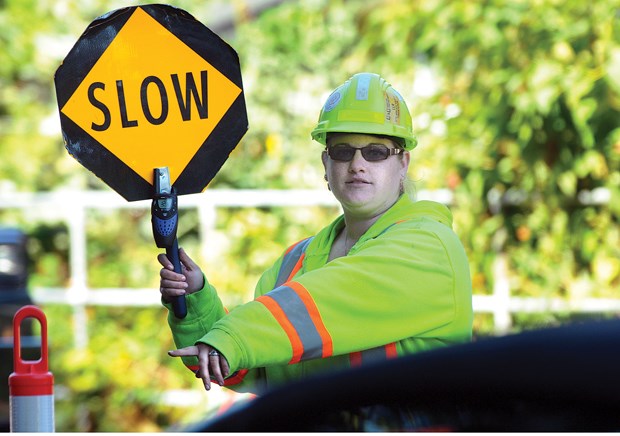"I love my job."
Jessica Gray, 24, is a flagger, or what's known in the industry as a TCP, traffic control person. She's bright and articulate and has a positive outlook on life.
"I love every aspect of my job. I love the people I work with, and it's nice to come into an environment where I have some support from my boss," she says, sitting on the tailgate of her white Ford F150 in a parking stall at the Lynn Valley Tim Hortons, sipping on a Triple-Triple.
Gray started flagging four years ago in Quesnel. If there is just one thing she could change about her job, it would be for motorists to show her just a little respect.
"We're there for everyone's well-being and we're not trying to hurt anyone, but it hurts us when they call us names and flip us off," says Gray, who works as a TCP for Traffic Pro Services of Surrey, which provides traffic control and equipment rental to government and contractors throughout the Lower Mainland.
"It's really upsetting, because you think by now they would understand exactly why we're there. We're there to try and make everybody's day run a little smoother even though there are delays."
There are an estimated 15,000 TCPs certified to work on roads and construction sites in B.C. It is a stressful and dangerous job. Gray, who moved to the Lower Mainland from Quesnel in May, would like commuters to know that there's more to the job than holding a sign and holding up traffic. "People think we're there to purposely ruin their day and make them angry. .. that all we do is go out there and stand with a sign and put our hand on our hip."
She has the public's safety at heart. And that can take a personal toll. "We're on constant alert. We come home just strained. Our nerves are fried every day.
"You can either be a relaxed flagger and have something go wrong or you can be one of those sharp, alert flaggers that's going to make sure everyone's OK. If you're one of those relaxed flaggers and you feel no pain at the end of the day, you're not doing what you're supposed to be doing. But if you come home with tight shoulders, sore back, your feet are hurting, you have a headache that's pounding out of your ears, you did something right."
Despite the job stress, work as a TCP is interesting because it provides a window on a busy and exciting industry, she says. "I think it's a fantastic job for people who want to experience construction from a different point of view. Instead of being the crane operator or the backhoe operator, you get to be on the outside looking in and seeing what everybody does."
Like any job, however, it's not for everyone. Those who are in the trade, should be in it for the right reasons, she says. "To be successful in something, you have to have passion for it. The moment you lose that passion is the moment it's probably time to try something different," she says.
Gray doesn't expect to flag for the long term. "One day I'll go back to school and finish my criminology degree and I'll go to work in social services or whatever it was I was aiming to do four years ago. Right now this works for me. It pays my bills; it keeps me satisfied."
As in any business, there is a downside. For Gray, that was working as an accident response flagger in Quesnel. "I saw a lot of things I never want to see again," she says, apologizing as she chokes up. "Beyond the worst part of my job was having to go home to my family, who was alive and well, knowing that somebody wasn't going home to theirs."
To do the job confidently and correctly, a TCP must have more than the twoday training course that is the minimum requirement for certification, she says. (B.C. Construction Safety Alliance is currently reviewing the course to see where improvements can be made.) "Younger people come into this job almost with an invincible cockiness," says Gray, who believes that on-the-job training and experience is key to a TCP gaining the skills necessary to carry out work safely. "Building your confidence enough to be able to stop a semi-truck at 120 kilometres an hour on an open freeway is what's going to make you either one of the best or one of the worst."
Being a TCP requires respect for the job and the job site. "There's a difference between fearing and respecting. I hold a very high respect for my job and the machines I work around," she says.
"Today, we had a huge hole in the ground," says Gray of her day's work as a lane technician, working with a flagging partner to facilitate single-lane alternating traffic during a water main upgrade in the 1300-block of Mountain Highway. "I was always, always, always watching my traffic because I know there are a lot of elderly people around here and it's a very busy road, and sometimes you get distracted. I was making sure I was right on top of that hole, so nobody drove into it. Those little things you do, the extra time you do with your setup is what's going to make everyone go home safely."
As she packs up her truck and gets set to head home, Jessica Gray leaves commuters with one last thought for their next encounter with a flag person: "We work for a paycheque just like your lawyer or your live-in maid. Think of us like a telemarketer; you don't want to hear from us but eventually it will happen, and when it does, it's a matter of understanding that we're just there to do our job."



